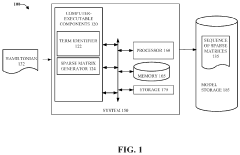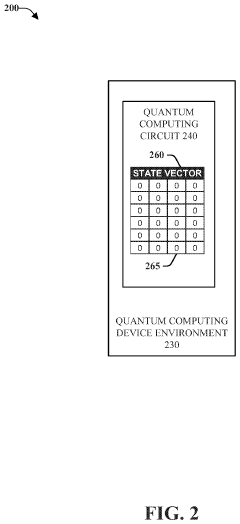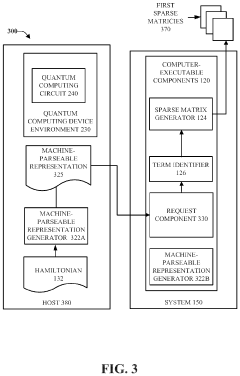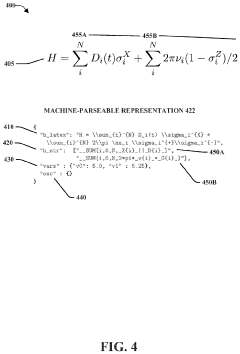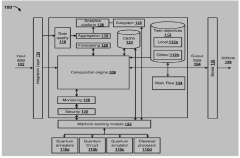Quantum Computing in Real-time Data Processing
JUL 17, 20259 MIN READ
Generate Your Research Report Instantly with AI Agent
Patsnap Eureka helps you evaluate technical feasibility & market potential.
Quantum Computing Evolution and Objectives
Quantum computing has emerged as a revolutionary technology with the potential to transform various fields, including real-time data processing. The evolution of quantum computing can be traced back to the early 1980s when Richard Feynman proposed the idea of using quantum mechanical systems for computation. Since then, the field has progressed rapidly, driven by advancements in quantum physics, engineering, and computer science.
The development of quantum computing has been marked by several key milestones. In the 1990s, Peter Shor's algorithm for factoring large numbers demonstrated the theoretical superiority of quantum computers over classical computers for certain tasks. This breakthrough sparked increased interest and investment in quantum computing research. The early 2000s saw the creation of the first rudimentary quantum computers, capable of manipulating a few qubits.
In recent years, quantum computing has made significant strides, with major tech companies and research institutions developing increasingly powerful quantum processors. IBM, Google, and others have announced quantum computers with 50+ qubits, demonstrating quantum supremacy for specific tasks. However, these systems still face challenges in terms of qubit coherence, error correction, and scalability.
The primary objective of quantum computing in real-time data processing is to leverage the unique properties of quantum systems, such as superposition and entanglement, to process and analyze vast amounts of data at unprecedented speeds. This capability has the potential to revolutionize fields such as financial modeling, weather forecasting, and complex system simulations, where real-time analysis of large datasets is crucial.
Specific goals in this domain include developing quantum algorithms optimized for real-time data processing, creating robust quantum error correction techniques to maintain data integrity, and designing quantum-classical hybrid systems that can effectively interface with existing data processing infrastructure. Additionally, researchers aim to increase the number of qubits while maintaining their coherence, a critical factor in achieving practical quantum advantage for real-time applications.
The future trajectory of quantum computing in real-time data processing is expected to focus on overcoming current limitations and scaling up quantum systems. This includes improving qubit quality and quantity, developing more sophisticated quantum algorithms, and creating specialized quantum hardware for specific data processing tasks. As the technology matures, the integration of quantum computing with classical high-performance computing systems is anticipated to create powerful hybrid solutions capable of handling complex real-time data processing challenges across various industries.
The development of quantum computing has been marked by several key milestones. In the 1990s, Peter Shor's algorithm for factoring large numbers demonstrated the theoretical superiority of quantum computers over classical computers for certain tasks. This breakthrough sparked increased interest and investment in quantum computing research. The early 2000s saw the creation of the first rudimentary quantum computers, capable of manipulating a few qubits.
In recent years, quantum computing has made significant strides, with major tech companies and research institutions developing increasingly powerful quantum processors. IBM, Google, and others have announced quantum computers with 50+ qubits, demonstrating quantum supremacy for specific tasks. However, these systems still face challenges in terms of qubit coherence, error correction, and scalability.
The primary objective of quantum computing in real-time data processing is to leverage the unique properties of quantum systems, such as superposition and entanglement, to process and analyze vast amounts of data at unprecedented speeds. This capability has the potential to revolutionize fields such as financial modeling, weather forecasting, and complex system simulations, where real-time analysis of large datasets is crucial.
Specific goals in this domain include developing quantum algorithms optimized for real-time data processing, creating robust quantum error correction techniques to maintain data integrity, and designing quantum-classical hybrid systems that can effectively interface with existing data processing infrastructure. Additionally, researchers aim to increase the number of qubits while maintaining their coherence, a critical factor in achieving practical quantum advantage for real-time applications.
The future trajectory of quantum computing in real-time data processing is expected to focus on overcoming current limitations and scaling up quantum systems. This includes improving qubit quality and quantity, developing more sophisticated quantum algorithms, and creating specialized quantum hardware for specific data processing tasks. As the technology matures, the integration of quantum computing with classical high-performance computing systems is anticipated to create powerful hybrid solutions capable of handling complex real-time data processing challenges across various industries.
Real-time Data Processing Market Analysis
The real-time data processing market has experienced significant growth in recent years, driven by the increasing demand for instant insights and decision-making capabilities across various industries. This market segment is characterized by the need to analyze and act upon large volumes of data as it is generated, enabling organizations to respond quickly to changing conditions and optimize their operations.
The global real-time data processing market size was valued at approximately $15 billion in 2020 and is projected to reach $35 billion by 2025, growing at a compound annual growth rate (CAGR) of 18.5% during the forecast period. This robust growth is fueled by the proliferation of Internet of Things (IoT) devices, the rise of edge computing, and the increasing adoption of artificial intelligence and machine learning technologies.
Several key industries are driving the demand for real-time data processing solutions. The financial services sector, including banking and stock trading, relies heavily on real-time analytics for fraud detection, risk management, and algorithmic trading. Retail and e-commerce companies leverage real-time data processing for personalized marketing, inventory management, and dynamic pricing strategies. Manufacturing firms use real-time analytics for predictive maintenance, quality control, and supply chain optimization.
The healthcare industry is another significant adopter of real-time data processing technologies, utilizing them for patient monitoring, disease outbreak prediction, and resource allocation. Telecommunications companies employ real-time analytics for network optimization, customer experience management, and fraud detection. Additionally, the transportation and logistics sector benefits from real-time data processing for route optimization, fleet management, and predictive maintenance.
As the volume and velocity of data continue to increase, organizations are facing challenges in processing and analyzing this information in real-time. Traditional data processing systems often struggle to keep up with the demands of modern applications, leading to a growing interest in more advanced technologies such as stream processing, in-memory computing, and distributed computing architectures.
The emergence of 5G networks and edge computing is expected to further accelerate the growth of the real-time data processing market. These technologies will enable faster data transmission and processing closer to the source, reducing latency and improving overall system performance. This trend is particularly relevant for applications in autonomous vehicles, smart cities, and industrial IoT.
As the market for real-time data processing continues to evolve, there is a growing interest in exploring the potential of quantum computing to address the limitations of classical computing systems. Quantum computing's ability to process vast amounts of data simultaneously could revolutionize real-time analytics, enabling organizations to tackle complex problems that are currently intractable with classical systems.
The global real-time data processing market size was valued at approximately $15 billion in 2020 and is projected to reach $35 billion by 2025, growing at a compound annual growth rate (CAGR) of 18.5% during the forecast period. This robust growth is fueled by the proliferation of Internet of Things (IoT) devices, the rise of edge computing, and the increasing adoption of artificial intelligence and machine learning technologies.
Several key industries are driving the demand for real-time data processing solutions. The financial services sector, including banking and stock trading, relies heavily on real-time analytics for fraud detection, risk management, and algorithmic trading. Retail and e-commerce companies leverage real-time data processing for personalized marketing, inventory management, and dynamic pricing strategies. Manufacturing firms use real-time analytics for predictive maintenance, quality control, and supply chain optimization.
The healthcare industry is another significant adopter of real-time data processing technologies, utilizing them for patient monitoring, disease outbreak prediction, and resource allocation. Telecommunications companies employ real-time analytics for network optimization, customer experience management, and fraud detection. Additionally, the transportation and logistics sector benefits from real-time data processing for route optimization, fleet management, and predictive maintenance.
As the volume and velocity of data continue to increase, organizations are facing challenges in processing and analyzing this information in real-time. Traditional data processing systems often struggle to keep up with the demands of modern applications, leading to a growing interest in more advanced technologies such as stream processing, in-memory computing, and distributed computing architectures.
The emergence of 5G networks and edge computing is expected to further accelerate the growth of the real-time data processing market. These technologies will enable faster data transmission and processing closer to the source, reducing latency and improving overall system performance. This trend is particularly relevant for applications in autonomous vehicles, smart cities, and industrial IoT.
As the market for real-time data processing continues to evolve, there is a growing interest in exploring the potential of quantum computing to address the limitations of classical computing systems. Quantum computing's ability to process vast amounts of data simultaneously could revolutionize real-time analytics, enabling organizations to tackle complex problems that are currently intractable with classical systems.
Quantum Computing Challenges in Data Processing
Quantum computing presents significant challenges when applied to real-time data processing. The primary obstacle lies in the inherent nature of quantum systems, which are highly sensitive to environmental disturbances. This sensitivity leads to decoherence, a phenomenon where quantum states lose their coherence and revert to classical behavior. In the context of data processing, this means that quantum computations must be completed before decoherence occurs, limiting the time available for complex calculations.
Another major challenge is the error rate in quantum computations. Current quantum systems are prone to errors due to imperfect control of qubits and quantum gates. While error correction techniques exist, they require additional qubits and computational overhead, which can slow down processing speeds. This trade-off between error correction and processing speed is particularly problematic for real-time applications that demand both accuracy and immediacy.
The scalability of quantum systems for large-scale data processing is also a significant hurdle. As the number of qubits increases, so does the complexity of maintaining quantum coherence and controlling the system. This scalability issue limits the size of datasets that can be effectively processed using quantum computers, potentially restricting their application in big data scenarios.
Interfacing quantum systems with classical data processing infrastructure poses another challenge. Real-time data processing often involves continuous streams of classical data that need to be converted into quantum states, processed, and then converted back to classical form. This quantum-classical interface can introduce latency and bottlenecks, potentially negating the speed advantages of quantum computing.
The development of quantum algorithms suitable for real-time data processing is an ongoing challenge. While quantum algorithms have shown theoretical advantages in certain computational tasks, adapting these algorithms for real-time scenarios and diverse data types remains a complex undertaking. Many existing quantum algorithms are designed for specific problems and may not be directly applicable to general-purpose data processing tasks.
Lastly, the cost and complexity of quantum hardware present practical challenges for widespread adoption in real-time data processing applications. Quantum computers require specialized infrastructure, including extreme cooling systems and precise control mechanisms. These requirements make it difficult to integrate quantum computing capabilities into existing data processing workflows and environments.
Another major challenge is the error rate in quantum computations. Current quantum systems are prone to errors due to imperfect control of qubits and quantum gates. While error correction techniques exist, they require additional qubits and computational overhead, which can slow down processing speeds. This trade-off between error correction and processing speed is particularly problematic for real-time applications that demand both accuracy and immediacy.
The scalability of quantum systems for large-scale data processing is also a significant hurdle. As the number of qubits increases, so does the complexity of maintaining quantum coherence and controlling the system. This scalability issue limits the size of datasets that can be effectively processed using quantum computers, potentially restricting their application in big data scenarios.
Interfacing quantum systems with classical data processing infrastructure poses another challenge. Real-time data processing often involves continuous streams of classical data that need to be converted into quantum states, processed, and then converted back to classical form. This quantum-classical interface can introduce latency and bottlenecks, potentially negating the speed advantages of quantum computing.
The development of quantum algorithms suitable for real-time data processing is an ongoing challenge. While quantum algorithms have shown theoretical advantages in certain computational tasks, adapting these algorithms for real-time scenarios and diverse data types remains a complex undertaking. Many existing quantum algorithms are designed for specific problems and may not be directly applicable to general-purpose data processing tasks.
Lastly, the cost and complexity of quantum hardware present practical challenges for widespread adoption in real-time data processing applications. Quantum computers require specialized infrastructure, including extreme cooling systems and precise control mechanisms. These requirements make it difficult to integrate quantum computing capabilities into existing data processing workflows and environments.
Current Quantum-based Data Processing Solutions
01 Quantum circuit optimization for improved processing speed
Techniques for optimizing quantum circuits to enhance processing speed in quantum computing. This involves methods for reducing the number of gates, minimizing circuit depth, and improving qubit utilization to achieve faster quantum computations.- Quantum circuit optimization for improved processing speed: Techniques for optimizing quantum circuits to enhance processing speed in quantum computing. This involves methods for reducing circuit depth, minimizing gate count, and improving qubit utilization. Such optimizations can significantly reduce computation time and increase the efficiency of quantum algorithms.
- Error correction and mitigation in quantum computing: Implementation of error correction and mitigation techniques to improve the reliability and speed of quantum computations. This includes methods for detecting and correcting quantum errors, as well as strategies to reduce the impact of noise on quantum systems, thereby enhancing overall processing speed and accuracy.
- Quantum-classical hybrid computing approaches: Development of hybrid quantum-classical computing architectures to leverage the strengths of both paradigms. This approach combines quantum processors with classical computers to optimize certain computational tasks, potentially leading to significant speed improvements for specific problems.
- Quantum memory and qubit connectivity enhancements: Advancements in quantum memory technologies and improvements in qubit connectivity to boost processing speeds. This includes developing more efficient quantum memory systems and enhancing the interconnections between qubits to facilitate faster and more complex quantum operations.
- Quantum algorithm optimization for specific applications: Tailoring and optimizing quantum algorithms for specific applications to improve processing speed. This involves developing specialized quantum algorithms that can outperform classical counterparts in areas such as cryptography, machine learning, and complex system simulations.
02 Quantum error correction for enhanced computational efficiency
Implementation of quantum error correction methods to improve the reliability and speed of quantum computations. These techniques aim to mitigate the effects of decoherence and other quantum noise sources, allowing for longer and more complex quantum algorithms to be executed efficiently.Expand Specific Solutions03 Hybrid quantum-classical computing architectures
Development of hybrid systems that combine quantum and classical computing elements to optimize processing speed. These architectures leverage the strengths of both quantum and classical processors to achieve superior performance in certain computational tasks.Expand Specific Solutions04 Quantum memory optimization for faster data access
Techniques for improving quantum memory systems to enhance data access speeds in quantum computers. This includes methods for efficient quantum state preparation, storage, and retrieval, which are crucial for accelerating quantum algorithms and computations.Expand Specific Solutions05 Parallelization techniques in quantum computing
Implementation of parallelization strategies to increase the processing speed of quantum computations. This involves methods for distributing quantum tasks across multiple qubits or quantum processors, enabling simultaneous execution of quantum operations and algorithms.Expand Specific Solutions
Key Quantum Computing Industry Players
The quantum computing landscape for real-time data processing is rapidly evolving, with the market currently in its early growth stage. Major players like IBM, Google, and Intel are investing heavily in quantum technologies, while startups such as IonQ and Rigetti are making significant strides. The market size is projected to expand substantially in the coming years, driven by increasing demand for faster data processing in various industries. Technological maturity varies among companies, with established tech giants like IBM and Google leading in quantum hardware development, while others focus on specialized quantum software and algorithms. Origin Quantum and Baidu are emerging as key players in the Asian market, contributing to the global advancement of quantum computing for real-time data applications.
International Business Machines Corp.
Technical Solution: IBM's quantum computing approach for real-time data processing leverages their advanced quantum hardware and software stack. They have developed the Qiskit Runtime, a quantum computing service and programming model that allows for efficient execution of quantum circuits in a cloud-based environment[1]. This system enables faster processing of quantum algorithms, which is crucial for real-time applications. IBM's quantum processors, such as the 127-qubit Eagle processor, provide the computational power needed for complex real-time data processing tasks[2]. Additionally, IBM has implemented error mitigation techniques and quantum-classical hybrid algorithms to enhance the reliability and speed of quantum computations in real-time scenarios[3].
Strengths: Industry-leading quantum hardware, comprehensive software stack, and cloud integration. Weaknesses: Quantum error rates still limit some real-time applications, and scalability remains a challenge for larger datasets.
Amazon Technologies, Inc.
Technical Solution: Amazon's approach to quantum computing in real-time data processing focuses on their Amazon Braket service, which provides access to various quantum hardware and simulators. For real-time applications, Amazon has developed hybrid quantum-classical algorithms that can process data streams using both quantum and classical resources[4]. Their quantum annealing solutions, particularly through D-Wave systems available on Braket, are well-suited for optimization problems in real-time scenarios[5]. Amazon also emphasizes the integration of quantum processing with their existing cloud infrastructure, allowing for seamless data flow between quantum and classical systems, which is crucial for real-time processing[6].
Strengths: Diverse quantum hardware access, strong cloud integration, and hybrid computing capabilities. Weaknesses: Reliance on third-party quantum hardware may limit some customization options for real-time applications.
Quantum Algorithms for Real-time Data Analysis
Representing the operation of a quantum computing device over time
PatentActiveUS11704455B2
Innovation
- The system employs a machine-parseable representation of a quantum computing device's Hamiltonian, using sparse matrices to model time-dependent terms and noise effects, allowing for the simulation of state vector evolution and noise impacts on the device's operation.
ELSM- Quantum Computing: EXTREMELY LARGE DATABASES STORE INTO A SMALL MEMORY USING QUANTUM COMPUTING.
PatentInactiveAU2020102026A4
Innovation
- A quantum computing machine learning module that routes computational tasks to either quantum or classical resources based on properties like computational time, cost, and error tolerance, using machine learning to determine optimal resource allocation and adapt to evolving hardware capabilities.
Quantum Computing Infrastructure Requirements
Quantum computing infrastructure requirements for real-time data processing are significantly different from those of classical computing systems. The fundamental building blocks of quantum computing infrastructure include quantum processors, cryogenic systems, control electronics, and specialized software stacks.
Quantum processors, the heart of quantum computing systems, require extreme environmental conditions to maintain quantum coherence. These processors operate at near-absolute zero temperatures, necessitating advanced cryogenic systems. Dilution refrigerators capable of achieving and maintaining temperatures as low as 10 millikelvin are essential components of quantum computing infrastructure.
Control electronics play a crucial role in manipulating and reading quantum states. These systems must be capable of generating and measuring high-frequency, low-noise signals with precise timing. The control electronics need to interface seamlessly with both the quantum processor and classical computing systems for data input and output.
Quantum error correction is a critical aspect of quantum computing infrastructure. As quantum systems are highly susceptible to environmental noise and decoherence, robust error correction mechanisms are necessary to ensure reliable computation. This requires additional qubits dedicated to error correction and sophisticated algorithms to detect and correct errors in real-time.
Scalability is a significant challenge in quantum computing infrastructure. As the number of qubits increases, the complexity of control systems and error correction mechanisms grows exponentially. Developing scalable architectures that can support thousands or even millions of qubits is crucial for practical real-time data processing applications.
Quantum-classical hybrid systems are essential for integrating quantum computers with existing classical data processing infrastructure. These systems require specialized interfaces and protocols to efficiently transfer data between quantum and classical domains. Additionally, software frameworks that can seamlessly orchestrate quantum and classical computations are necessary for real-time data processing applications.
Power management is another critical consideration in quantum computing infrastructure. The cryogenic systems and control electronics consume substantial amounts of energy. Developing energy-efficient cooling technologies and optimizing power distribution systems are essential for the practical deployment of quantum computers in real-time data processing scenarios.
Quantum processors, the heart of quantum computing systems, require extreme environmental conditions to maintain quantum coherence. These processors operate at near-absolute zero temperatures, necessitating advanced cryogenic systems. Dilution refrigerators capable of achieving and maintaining temperatures as low as 10 millikelvin are essential components of quantum computing infrastructure.
Control electronics play a crucial role in manipulating and reading quantum states. These systems must be capable of generating and measuring high-frequency, low-noise signals with precise timing. The control electronics need to interface seamlessly with both the quantum processor and classical computing systems for data input and output.
Quantum error correction is a critical aspect of quantum computing infrastructure. As quantum systems are highly susceptible to environmental noise and decoherence, robust error correction mechanisms are necessary to ensure reliable computation. This requires additional qubits dedicated to error correction and sophisticated algorithms to detect and correct errors in real-time.
Scalability is a significant challenge in quantum computing infrastructure. As the number of qubits increases, the complexity of control systems and error correction mechanisms grows exponentially. Developing scalable architectures that can support thousands or even millions of qubits is crucial for practical real-time data processing applications.
Quantum-classical hybrid systems are essential for integrating quantum computers with existing classical data processing infrastructure. These systems require specialized interfaces and protocols to efficiently transfer data between quantum and classical domains. Additionally, software frameworks that can seamlessly orchestrate quantum and classical computations are necessary for real-time data processing applications.
Power management is another critical consideration in quantum computing infrastructure. The cryogenic systems and control electronics consume substantial amounts of energy. Developing energy-efficient cooling technologies and optimizing power distribution systems are essential for the practical deployment of quantum computers in real-time data processing scenarios.
Quantum-Classical Hybrid Systems for Data Processing
Quantum-classical hybrid systems represent a promising approach to leveraging the strengths of both quantum and classical computing paradigms for real-time data processing. These systems combine the power of quantum algorithms for specific computational tasks with the reliability and scalability of classical computing infrastructure.
In hybrid systems, quantum processors are typically used for specialized computations that can benefit from quantum speedup, such as optimization problems or certain types of simulations. The classical components handle data input/output, pre-processing, and post-processing tasks, as well as overall system control and management.
One key advantage of hybrid systems is their ability to address the current limitations of quantum hardware, such as limited qubit counts and high error rates. By offloading certain tasks to classical processors, hybrid systems can mitigate these constraints while still harnessing quantum advantages where applicable.
For real-time data processing, quantum-classical hybrid systems offer potential benefits in areas such as financial modeling, weather forecasting, and complex system simulations. In these applications, quantum algorithms can be used to accelerate specific computational bottlenecks, while classical components handle the continuous stream of data input and output.
Implementing quantum-classical hybrid systems for data processing presents several challenges. These include developing efficient interfaces between quantum and classical components, optimizing the distribution of tasks between the two paradigms, and managing the inherent differences in processing speeds and data formats.
Current research in this area focuses on developing hybrid algorithms that can seamlessly integrate quantum and classical computations. This involves identifying which parts of a data processing pipeline are most suitable for quantum acceleration and designing algorithms that can effectively switch between quantum and classical modes of operation.
As quantum hardware continues to improve, the balance between quantum and classical components in hybrid systems is likely to shift. Future developments may lead to more sophisticated hybrid architectures that can dynamically allocate computational resources based on the specific requirements of each data processing task.
In hybrid systems, quantum processors are typically used for specialized computations that can benefit from quantum speedup, such as optimization problems or certain types of simulations. The classical components handle data input/output, pre-processing, and post-processing tasks, as well as overall system control and management.
One key advantage of hybrid systems is their ability to address the current limitations of quantum hardware, such as limited qubit counts and high error rates. By offloading certain tasks to classical processors, hybrid systems can mitigate these constraints while still harnessing quantum advantages where applicable.
For real-time data processing, quantum-classical hybrid systems offer potential benefits in areas such as financial modeling, weather forecasting, and complex system simulations. In these applications, quantum algorithms can be used to accelerate specific computational bottlenecks, while classical components handle the continuous stream of data input and output.
Implementing quantum-classical hybrid systems for data processing presents several challenges. These include developing efficient interfaces between quantum and classical components, optimizing the distribution of tasks between the two paradigms, and managing the inherent differences in processing speeds and data formats.
Current research in this area focuses on developing hybrid algorithms that can seamlessly integrate quantum and classical computations. This involves identifying which parts of a data processing pipeline are most suitable for quantum acceleration and designing algorithms that can effectively switch between quantum and classical modes of operation.
As quantum hardware continues to improve, the balance between quantum and classical components in hybrid systems is likely to shift. Future developments may lead to more sophisticated hybrid architectures that can dynamically allocate computational resources based on the specific requirements of each data processing task.
Unlock deeper insights with Patsnap Eureka Quick Research — get a full tech report to explore trends and direct your research. Try now!
Generate Your Research Report Instantly with AI Agent
Supercharge your innovation with Patsnap Eureka AI Agent Platform!
